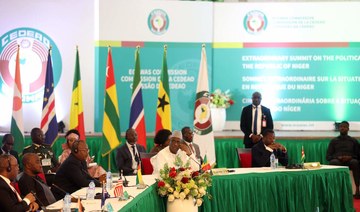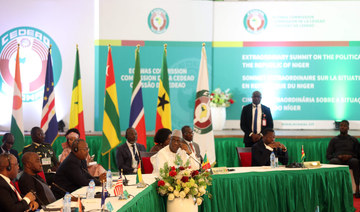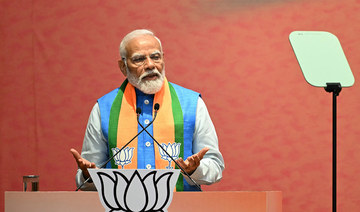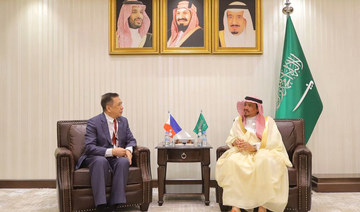NIAMEY: Tensions are escalating between Niger’s new military regime and the West African regional bloc that has ordered the deployment of troops to restore Niger’s flailing democracy.
The ECOWAS bloc said on Thursday it had directed a “standby force” to restore constitutional order in Niger after its Sunday deadline to reinstate ousted President Mohamed Bazoum expired.
Hours earlier, two Western officials told The Associated Press that Niger’s junta had told a top US diplomat they would kill Bazoum if neighboring countries attempted any military intervention to restore his rule.
It’s unclear when or where the force will deploy and which countries from the 15-member bloc would contribute to it. Conflict experts say it would likely comprise some 5,000 troops led by Nigeria and could be ready within weeks.
After the ECOWAS meeting, neighboring Ivory Coast’s president, Alassane Ouattara, said his country would take part in the military operation, along with Nigeria and Benin.
“Ivory Coast will provide a battalion and has made all the financial arrangements ... We are determined to install Bazoum in his position. Our objective is peace and stability in the sub-region,” Ouattara said on state television.
Niger, an impoverished country of some 25 million people, was seen as one of the last hopes for Western nations to partner with in beating back a jihadi insurgency linked to Al-Qaeda and the Daesh group that’s ravaged the region. France and the United States have more than 2,500 military personnel in Niger and together with other European partners had poured hundreds of millions of dollars into propping up its military.
The junta responsible for spearheading the coup, led by Gen. Abdourahmane Tchiani, has exploited anti-French sentiment among the population to shore up its support.
Nigeriens in the capital, Niamey, on Friday said ECOWAS isn’t in touch with the reality on the ground and shouldn’t intervene.
“It is our business, not theirs. They don’t even know the reason why the coup happened in Niger,” said Achirou Harouna Albassi, a resident. Bazoum was not abiding by the will of the people, he said.
On Friday the African Union expressed strong support for ECOWAS’ decision and called on the junta to “urgently halt the escalation with the regional organization.” It also called for the immediate release of Bazoum. An African Union meeting to discuss the situation in Niger expected on Saturday was postponed.
On Thursday night after the summit, France’s foreign ministry said it supported “all conclusions adopted.” US Secretary of State Antony Blinken said his country appreciated “the determination of ECOWAS to explore all options for the peaceful resolution of the crisis” and would hold the junta accountable for the safety and security of President Bazoum. However, he did not specify whether the US supported the deployment of troops.
The mutinous soldiers that ousted Bazoum more than two weeks ago have entrenched themselves in power, appear closed to dialogue and have refused to release the president. Representatives of the junta told US Under Secretary of State Victoria Nuland of the threat to Bazoum’s life during her visit to the country this week, a Western military official said, speaking on condition of anonymity because of the sensitivity of the situation.
A US official confirmed that account, also speaking on condition of anonymity, because they were not authorized to speak to the media.
“The threat to kill Bazoum is grim,” said Alexander Thurston, assistant professor of political science at the University of Cincinnati. There have been unwritten rules until now about how overthrown presidents will be treated and violence against Bazoum would evoke some of the worst coups of the past, he said.
Human Rights Watch said Friday that it had spoken to Bazoum, who said that his 20-year-old son was sick with a serious heart condition and has been refused access to a doctor. The president said he hasn’t had electricity for nearly 10 days and isn’t allowed to see family, friends or bring supplies into the house.
It’s unclear if the threat on Bazoum’s life would change ECOWAS’ decision to intervene military. It might give them pause, or push the parties closer to dialogue, but the situation has entered uncharted territory, analysts say.
“An ECOWAS invasion to restore constitutional order into a country of Niger’s size and population would be unprecedented,” said Nate Allen, an associate professor at the Africa Center for Strategic Studies. Niger has a fairly large and well-trained army that, if it actively resisted an invasion, could pose significant problems for ECOWAS. This would be a very large and significant undertaking, he said.
While the region oscillates between mediation and preparing for war, Nigeriens are suffering the impact of harsh economic and travel sanctions imposed by ECOWAS.
Before the coup, more than 4 million Nigeriens were reliant on humanitarian assistance and the situation could become more dire, said Louise Aubin, the United Nations Resident Coordinator in Niger.
“The situation is alarming. ... We’ll see an exponential rise and more people needing more humanitarian assistance,” she said, adding that the closure of land and air borders makes it hard to bring aid into the country and it’s unclear how long the current stock will last.
Aid groups are battling restrictions on multiple fronts.
ECOWAS sanctions have banned the movement of goods between member countries, making it hard to bring in materials. The World Food Program has some 30 trucks stuck at the Benin border unable to cross. Humanitarians are also trying to navigate restrictions within the country as the junta has closed the airspace, making it hard to get clearance to fly the humanitarian planes that transport goods and personnel to hard-hit areas.
Flights are cleared on a case-by-case basis and there’s irregular access to fuel, which disrupts aid operations, Aubin said.
The UN has asked ECOWAS to make exceptions to the sanctions and is speaking to Niger’s foreign ministry about doing the same within the country.
Tensions rise as West African nations prepare to send troops to restore democracy in Niger
https://arab.news/m6nrv
Tensions rise as West African nations prepare to send troops to restore democracy in Niger
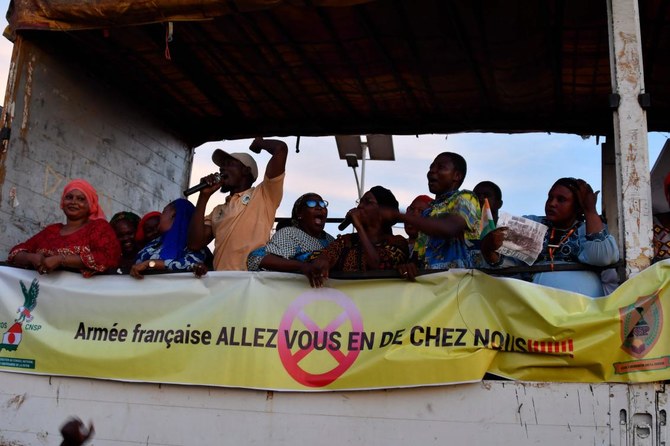
- Tensions are escalating between Niger’s new military regime and the West African regional bloc that has ordered troops deployed to restore Niger’s flailing democracy
- It would likely comprise some 5,000 troops, mostly led by Nigeria, and could be ready within weeks
Police aim to break up pro-Palestine protests in Amsterdam

- The Eindhoven University of Technology confirmed that there were “dozens of students peacefully protesting outside next to ten to 15 tents”
AMSTERDAM: Police moved in to end a pro-Palestinian protest at the University of Amsterdam on Monday after protesters occupied university buildings in various Dutch cities to condemn Israel’s war in Gaza, ANP news agency reported.
Earlier on Monday, a Dutch protest group said it had occupied university buildings in the Dutch cities of Amsterdam, Groningen and Eindhoven.
In a post on social media site X, Amsterdam police said the university had filed a police report against the protesters for acts of vandalism.
Police made sure no one entered the university buildings and asked protesters to leave the premises voluntarily.
A spokesperson for the University of Amsterdam confirmed the occupation and said it had advised people not affiliated with the protest to leave the building.
The Eindhoven University of Technology confirmed that there were “dozens of students peacefully protesting outside next to ten to 15 tents.”
Students in the Netherlands have been protesting against Israel’s war in Gaza since last Monday and Dutch riot police had previously clashed with protesters at the University of Amsterdam.
Students in the US and Europe have also been holding mostly peaceful demonstrations calling for an immediate permanent ceasefire and for schools to cut financial ties with companies they say are profiting from the oppression of Palestinians.
Ukraine’s first lady and foreign minister visit Russia-friendly Serbia

- Although Serbia has condemned the Russian aggression on Ukraine, it has refused to join international sanctions against Moscow
BELGRADE, Serbia: Ukrainian Foreign Minister Dmytro Kuleba made a surprise visit to Russia-friendly Serbia on Monday, together with Ukraine’s first lady, Olena Zelenska, in a sign of warming relations between the two states.
On his first visit to Serbia since the start of the Russian aggression on Ukraine in 2022, Kuleba met Serbian President Aleksandar Vucic and new Serbian Prime Minister Milos Vucevic, whose government includes several pro-Russian ministers, including two who have been under US sanctions.
A statement issued by the prime minister’s office after the talks said that “Serbia is committed to respecting international law and the territorial integrity of every member state of the United Nations, including Ukraine.”
Although Serbia has condemned the Russian aggression on Ukraine, it has refused to join international sanctions against Moscow and has instead maintained warm and friendly relations with its traditional Slavic ally.
Serbia has proclaimed neutrality regarding the war in Ukraine, and its authorities repeat that Serbia does not supply weapons to any parties. However, there are reports that Serbia has delivered weapons to Ukraine through intermediary countries. The visit by Kuleba and Zelenska, who toured the Serbian capital with Serbian first lady Tamara Vucic on Sunday, was met with criticism in Moscow. Comments by readers in the Russian state-run media such as “shameful” were published by RIA Novosti.
In what appears to be damage control, soon after his talks with Kuleba on Monday, Vucevic was to meet the Russian ambassador to Belgrade and the two were to tour a big storage facility for Russian gas that is being imported to Serbia.
Pro-Russian President Vucic has informally met Ukrainian President Volodymyr Zelenskyy three times on the sidelines of international conferences. Serbia has supplied Ukraine with humanitarian and financial aid.
Vucic has for years claimed to follow a “neutral” policy, balancing ties among Moscow, Beijing, Brussels and Washington. Although he has repeatedly said that Serbia is firm on its proclaimed goal of seeking European Union membership, under his authoritarian rule the Balkan country appears to be shifting closer to Russia and especially China.
During a high-stakes visit by Chinese President Xi Jinping to Belgrade last week, China and Serbia signed an agreement to build “ironclad” relations and a “shared joint future.”
Modi’s BJP skips Kashmir as Indian election enters fourth phase

- Millions of Indians across 96 constituencies began voting on Monday
- Ruling party is not fighting elections in Kashmir for first time in 30 years
NEW DELHI: India’s ruling Bharatiya Janata Party is not contesting elections in the Muslim-majority region of Kashmir for the first time in nearly three decades, as voting in the latest round of the national polls got underway on Monday.
The world’s most populous country began voting on April 19 in a seven-phase election that is scheduled to take place over six weeks, with ballots set to be counted on June 4.
India has 968 million people eligible to vote in the general election, where incumbent Prime Minister Narendra Modi and his Hindu nationalist BJP are aiming for a rare third consecutive term in power.
Monday’s voting involved 96 constituencies in the fourth round of polling.
While the BJP, which has been in power since 2014, and its allies are contesting every other part of India as they look to secure a majority of the 543 parliamentary seats, the party is sitting out in the northern Himalayan territory of Jammu and Kashmir.
This year marks the region’s first election since Modi’s government stripped the valley of its special autonomous status and statehood — which was granted by the Indian Constitution — on Aug. 5, 2019. The move unilaterally revoked the relevant provisions under Article 370, scrapping Kashmir’s flag, legislature, protections on land ownership and fundamental rights, sparking fears of demographic engineering in the region.
“It’s really surprising that the BJP, which claimed to have over 800,000 cadres in the valley, failed to find a single candidate. It shows that the BJP is not popular in the valley,” Sanjay Tickoo, the Srinagar-based leader of the Hindu minority group Kashmiri Pandit, told Arab News.
“I am expecting a record turnout to show the central government what (they) have done to the people of Jammu and Kashmir. This is the reflection of anger … no one is happy in the valley after the abrogation of Article 370.”
Indian-controlled Jammu and Kashmir is part of the larger Kashmiri territory, which has been the subject of international dispute since the 1947 partition of the Indian subcontinent into Hindu-majority India and Muslim-majority Pakistan. Both countries claim Kashmir in full and rule in part.
Modi said his government had been focusing on jobs and development as part of an effort to end violence in the valley, which has for decades witnessed outbreaks of separatist insurgencies to resist control from the government in New Delhi.
But after the BJP lost Kashmir’s three seats in the 2019 election, the party’s popularity slid further after it revoked the region’s autonomous status later the same year and subsequently imposed months of strict communication blockade and jailed hundreds of political leaders.
“The vote expresses not only anger but also apprehension against the anti-Muslim rants that have been going on as well as whatever they have done in Kashmir,” Professor Sheikh Showkat, a Srinagar-based political analyst, told Arab News.
Altaf Thakur, BJP spokesperson in Kashmir, said the party was still taking part in the Kashmir polls by supporting other regional parties.
“It is not correct to say that we are not fighting the election, we are playing the role of kingmaker and whichever way the cadres of the BJP will go, we will win,” he told Arab News.
“It’s not important whether we stand in the elections or not, the important thing is that we have to defeat the dynasty rulers,” he said, referring to the main contenders in the Kashmir polls, the National Conference and People’s Democratic Party.
While they are fighting each other in the valley, both parties have said they oppose the BJP and are part of the Congress party-led opposition alliance, known as India.
For some Kashmiri voters, Monday’s vote was about speaking up for themselves.
“The BJP knew that they cannot tolerate the wrath of the people of Kashmir. They fled the contest without a fight,” Aijaz Ahmed, a businessman from Srinagar, told Arab News.
“I voted today because it gave me an opportunity to express myself and tell the government in Delhi that you cannot keep us silenced. We want an atmosphere without fear and a region where our own identity is not questioned.”
5,000 Filipino pilgrims expected to fly to Makkah for Hajj

- Travelers ‘can expect VIP-like treatment,’ National Commission on Muslim Filipinos says
- First pilgrims will take off from Manila International Airport next week
MANILA: Thousands of Filipino pilgrims are set to travel to Makkah for the upcoming Hajj pilgrimage, the National Commission on Muslim Filipinos said on Monday, with the first batch set to leave for Saudi Arabia next week.
In the predominantly Catholic Philippines, Muslims constitute about 10 percent of the nearly 120 million population. Most live on the island of Mindanao and the Sulu archipelago in the country’s south, as well as in the central-western province of Palawan.
The commission said that nearly 5,000 Muslims had confirmed they would travel to Saudi Arabia to perform the Hajj pilgrimage this year.
“We have already processed 96 percent of the pilgrims,” Zainoden Usudan, chief of Hajj operations at the NCMF’s Bureau of Pilgrimage and Endowment, said.
“They can expect VIP-like treatment, allowing them to fully concentrate on their pilgrimage.”
Officials from the commission have been working hard to ensure that the difficulties faced by pilgrims last year will not be a problem this time around.
“This time, we are making sure that food will not be a problem,” Usudan said, referring to problems with delayed meal deliveries in 2023.
He said the commission was working with a service provider in the Kingdom that had contingency plans for all aspects of the trip, including transportation.
The first Hajj flight from the Philippines is set to take off from Manila International Airport on May 23.
One of the five pillars of Islam, this year’s Hajj is expected to run from June 14-19. Many pilgrims extend their stays to make the most of the once-in-a-lifetime opportunity to fulfill their religious duty.
Charities brand UK family reunion system for asylum-seekers ‘broken’

- New report says thousands waiting for relatives to be relocated to Britain
- Refugee Council CEO: ‘The UK has clearly failed the Afghan refugees that it promised to protect’
London: Charities in the UK have branded the country’s system for reuniting separated families of asylum-seekers “broken,” calling for the Home Office to “fix and expand” it.
A new report published by the Refugee Council and Safe Passage International has highlighted figures showing a backlog of more than 11,000 migrants in the UK waiting to be reunited with relatives during the summer last year.
Despite repeated freedom of information requests, the Home Office has not provided updated figures since then.
The report mentioned that a particular problem faces separated Afghan families, with many individuals reaching the UK but finding themselves in prolonged legal difficulty and their relatives forced to remain in Afghanistan, neighboring Pakistan or elsewhere.
Currently, Afghans evacuated from their country as part of Operation Pitting in August 2021 are prevented from automatically bringing close family to the UK.
In October 2023, the British government proposed a new system to address this issue, but the plan has yet to implemented despite pressure from MPs and members of the House of Lords.
Approved asylum-seekers can apply for a family reunification visa, but thousands find themselves stuck in a backlog of cases despite the Home Office saying the process should take under 12 weeks.
The Independent spoke to a number of Afghans, including a former pilot, struggling to be reunited with their relatives.
The pilot told the newspaper: “They (his family) have been waiting for a visa for five months in Iran, but so far there is no news from the embassy and there is no guarantee it will be issued.
“My family are facing a lot of problems. They don’t have a proper place to live, and don’t have access to a doctor, because they are living illegally.
“Their Iranian visas have expired and they need to extend them, but it is impossible. My wife is suffering mentally and emotionally, and she is completely (without hope).”
Another issue is that of unaccompanied children who, under current rules, also cannot use their status to automatically relocate their families to the UK.
The Independent spoke to one Afghan teenager, Farhad, rescued from Kabul without his parents in 2021, who faces an anxious wait to see if his family can join him in the UK.
“(The UK government) promised in 2021 that they’re going to bring the families, but it’s still been almost three years,” he said.
“My mum and my siblings are in Pakistan because they needed a doctor and medication. But my father couldn’t get the visa to go with them.
“I am doing my GCSEs this month and I can’t really focus on my studies knowing that my family is struggling.”
Safe Passage International highlighted the case of another young boy, Ahmad, who had tried to join his older brother in the UK.
Despite both his parents having died in Afghanistan, the Home Office denied that he had any “serious and compelling” circumstances to justify his asylum application.
He was only able to stay in the UK after a judge intervened, ordering the Home Office to provide assistance.
Safe Passage International’s CEO Dr. Wanda Wyporska told The Independent: “Nearly three years on, it’s a national shame that Afghans, who risked so much to support UK military operations, are still waiting for a way to bring their family to safety here with them. Their family members are living in fear every day of the Taliban.”
The Refugee Council’s CEO Enver Solomon said: “The UK has clearly failed the Afghan refugees that it promised to protect, by keeping families separated for so long with no information on how they may be reunited.
“After risking everything for the UK, Afghans and their families should not be forced to make dangerous boat journeys to get here, nor should they face hostile, inhumane policies like the Rwanda plan when they do make it to the UK.”
A Home Office spokesperson told The Independent: “We made one of the largest commitments of any country to support people from Afghanistan, and so far we have brought around 27,900 individuals to safety in the UK, including thousands under our Afghan resettlement schemes.
“In October we committed to establish a route for those evacuated from Afghanistan under Pathway 1 of the Afghan Citizens Resettlement Scheme without their immediate family members, to reunite them in the UK.
“We remain on track to meet that commitment and open the route for referrals in the first half of this year.”



